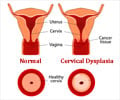The American College of Obstetricians and Gynecologists (ACOG) has said women should wait till the age of 21 for their first cervical cancer screening.
And further screenings could be less frequent than previously recommended, says the new guidelines of the association, published in the December issue of Obstetrics & Gynecology.Most women younger than 30 should undergo cervical screening once every two years instead of annually, and those age 30 and older can be rescreened once every three years.
Women should have their first cervical cancer screening at age 21 and can be rescreened less frequently than previously recommended, according to Cervical cancer rates have fallen more than 50% in the past 30 years in the US due to the widespread use of the Pap test. The incidence of cervical cancer fell from 14.8 per 100,000 women in 1975 to 6.5 per 100,000 women in 2006. The American Cancer Society estimates that there will be 11,270 new cases of cervical cancer and 4,070 deaths from it in the US in 2009. The majority of deaths from cervical cancer in the US are among women who are screened infrequently or not at all. Cervical cancer is a slow growing cancer caused by certain strains of the human papillomavirus (HPV), an extremely common sexually transmitted disease among women and men. HPV also causes genital and anal warts, as well as oral and anal cancer.
"The tradition of doing a Pap test every year has not been supported by recent scientific evidence," says Alan G. Waxman, MD, at the University of New Mexico in Albuquerque and who headed the document developed by ACOG's Committee on Practice Bulletins-Gynecology. "A review of the evidence to date shows that screening at less frequent intervals prevents cervical cancer just as well, has decreased costs, and avoids unnecessary interventions that could be harmful."
ACOG now recommends that women from ages 21 to 30 be screened every two years instead of annually, using either the standard Pap or liquid-based cytology. Women age 30 and older who have had three consecutive negative cervical cytology test results may be screened once every three years with either the Pap or liquid-based cytology. Women with certain risk factors may need more frequent screening, including those who have HIV, are immunosuppressed, were exposed to diethylstilbestrol (DES) in utero, and have been treated for cervical intraepithelial neoplasia (CIN) 2, CIN 3, or cervical cancer.
Only 0.1 percent of cervical cancer occurs in women under 21 years of age in part, doctors believe, because young women's immune systems are strong enough to fight off HPV before it causes cancer. When dysplasias progress to cancers it's usually a result of older women missing screenings for years at a time; 50 percent of women diagnosed with cervical cancer each year never had a pap smear before, according to the ACOG statement.
Advertisement
"The driving force behind the change was the numerous studies that show women who are treated for cervical dysplasias are more likely to have a preterm birth," said Waxman.
Advertisement
But, he added, new studies have shown "with most of the cervical abnormalities in adolescents, most of them get better by themselves. ... The thought is that these are the people who have most of their child-bearing years in front of them."
The ACOG recommendations cite studies showing that up to 90 percent of these infections are cleared on their own in adolescents within a few years.
"Adolescents have most of their childbearing years ahead of them, so it's important to avoid unnecessary procedures that negatively affect the cervix," says Dr. Waxman. "Screening for cervical cancer in adolescents only serves to increase their anxiety and has led to overuse of follow-up procedures for something that usually resolves on its own."
Also routine cervical cytology testing should be discontinued in women (regardless of age) who have had a total hysterectomy (removal of the cervix along with the uterus) for noncancerous reasons, as long as they have no history of high-grade CIN.
ACOG's recommendations on the upper age limit for discontinuing cervical screening remain the same. It is reasonable to stop cervical cancer screening at age 65 or 70 among women who have three or more negative cytology results in a row and no abnormal test results in the past 10 years. ACOG also recommends that women who have been vaccinated against HPV should follow the same screening guidelines as unvaccinated women.
Dr. Diane Harper of the University of Missouri-Kansas, who specializes in HPV infections, felt that ACOG is behind the other recommending bodies in the United States that argue screening should start at age 25, not age 21.
"There is ample evidence that screening earlier than 25 years is only costly with many false positives," said Harper. "The rest of the world is going to an every-five-or-six-year screening interval ... and ACOG is now just endorsing the three-year interval for HPV negative and Pap negative [women]," she told ABC News.
Source-Medindia
GPL














